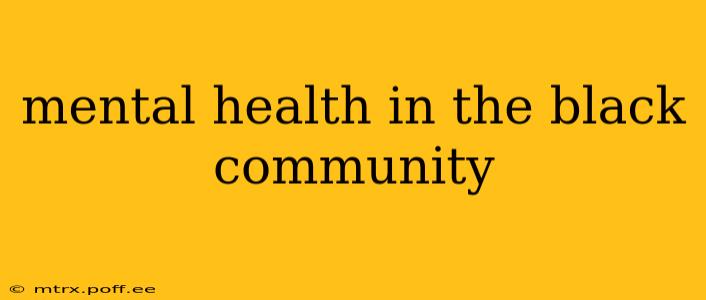Mental health is a crucial aspect of overall well-being, affecting every community. However, the Black community faces unique challenges and disparities in accessing and receiving adequate mental healthcare. Understanding these challenges is the first step towards fostering better mental health outcomes within the community. This article delves into the complexities of mental health within the Black community, addressing frequently asked questions and providing insights into promoting well-being.
What are the unique mental health challenges faced by Black people?
Black individuals experience a disproportionately high burden of mental health issues, often stemming from systemic factors like racism, discrimination, and socioeconomic inequalities. These stressors can manifest in various mental health conditions, including depression, anxiety, PTSD, and substance abuse. The historical trauma of slavery, Jim Crow laws, and ongoing systemic racism creates a legacy of intergenerational trauma that significantly impacts mental well-being. Furthermore, limited access to culturally competent mental healthcare providers can create barriers to seeking help. This lack of access is often compounded by the stigma surrounding mental illness, both within and outside the Black community.
How does racism impact mental health in the Black community?
Racism, in its various forms – from overt discrimination to microaggressions – is a significant source of chronic stress for Black individuals. Experiencing daily racism, whether it's racial profiling, workplace discrimination, or subtle biases, can lead to elevated levels of cortisol (the stress hormone), impacting both physical and mental health. This constant state of hypervigilance and the resulting psychological distress can contribute to the development and exacerbation of mental health conditions. The cumulative effect of these experiences can be devastating, leading to feelings of hopelessness, powerlessness, and anxiety.
What are the cultural barriers to seeking mental health care within the Black community?
Several cultural barriers contribute to underutilization of mental health services within the Black community. Historically, mental illness has been stigmatized, often leading to feelings of shame and reluctance to seek help. Some individuals may believe that seeking professional help is a sign of weakness or that they should be able to overcome their challenges independently. This stigma is further compounded by a lack of culturally sensitive mental health resources and a shortage of Black mental health professionals who understand the unique experiences and perspectives of the community. The mistrust of the healthcare system, rooted in historical injustices and present-day disparities, also plays a significant role.
What are some resources available to support the mental health of Black individuals?
Despite the challenges, various resources are available to support the mental health of Black individuals. Community-based organizations and support groups specifically designed to cater to the Black community provide safe spaces for individuals to connect, share experiences, and receive peer support. These groups often prioritize cultural sensitivity and understanding. Additionally, there's a growing number of Black mental health professionals who are dedicated to providing culturally competent care. Online resources and telehealth services are expanding access to mental health care, offering convenient and anonymous options for those who may feel hesitant to seek in-person help.
How can we reduce the stigma surrounding mental health in the Black community?
Reducing the stigma surrounding mental health requires a multifaceted approach. Open and honest conversations about mental health within families and communities are crucial. Educating communities about mental illness, dispelling myths and misconceptions, and promoting help-seeking behaviors are essential. Highlighting the successes of individuals who have sought and received mental health treatment can help normalize the experience. Public awareness campaigns that feature Black individuals and professionals can increase visibility and encourage help-seeking. Finally, advocating for increased funding for culturally competent mental health services and training for mental health professionals is essential to address the disparities in access to care.
How can I find a culturally competent mental health professional?
Finding a culturally competent mental health professional is paramount. Several strategies can help in this search:
- Online Directories: Many online directories allow you to search for therapists based on their specialties and cultural expertise. Look for therapists who explicitly mention experience working with the Black community.
- Community Organizations: Reach out to community organizations and support groups within the Black community. They may have recommendations or referral programs.
- Professional Organizations: Professional organizations for mental health providers often have directories of members who indicate their areas of expertise.
By addressing the unique challenges and promoting culturally sensitive care, we can work towards better mental health outcomes for the Black community. The journey towards better mental health is a collective one, requiring individual commitment, community support, and systemic change.
